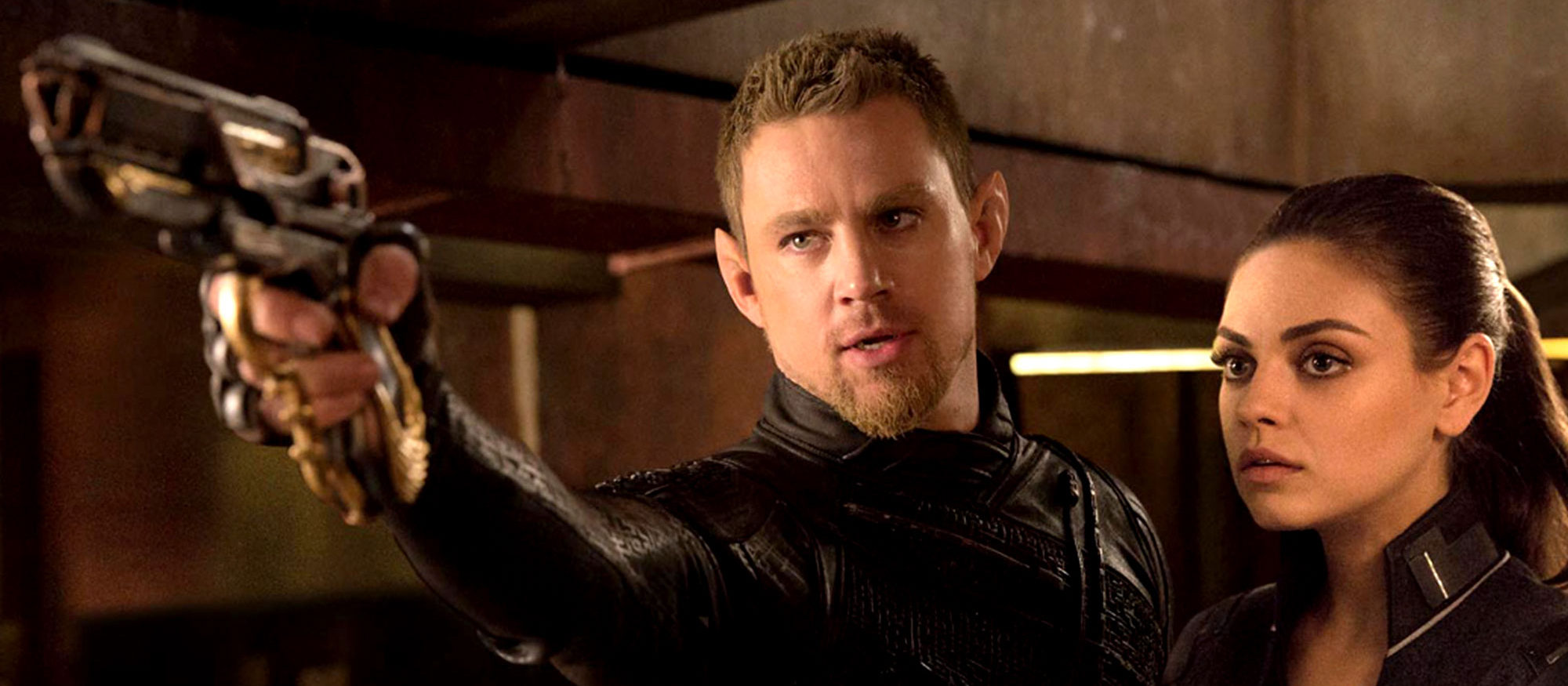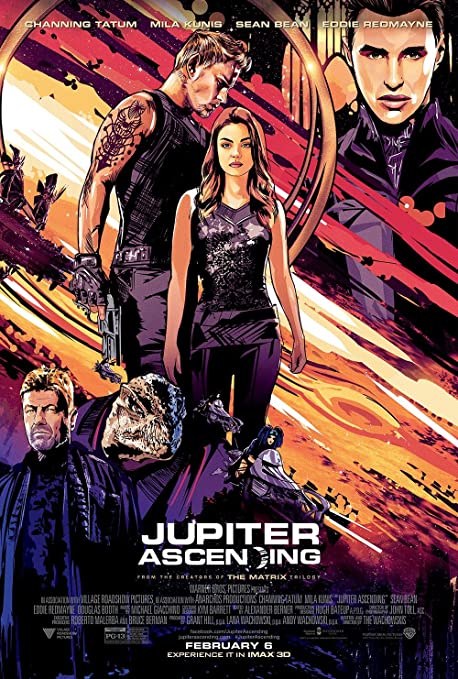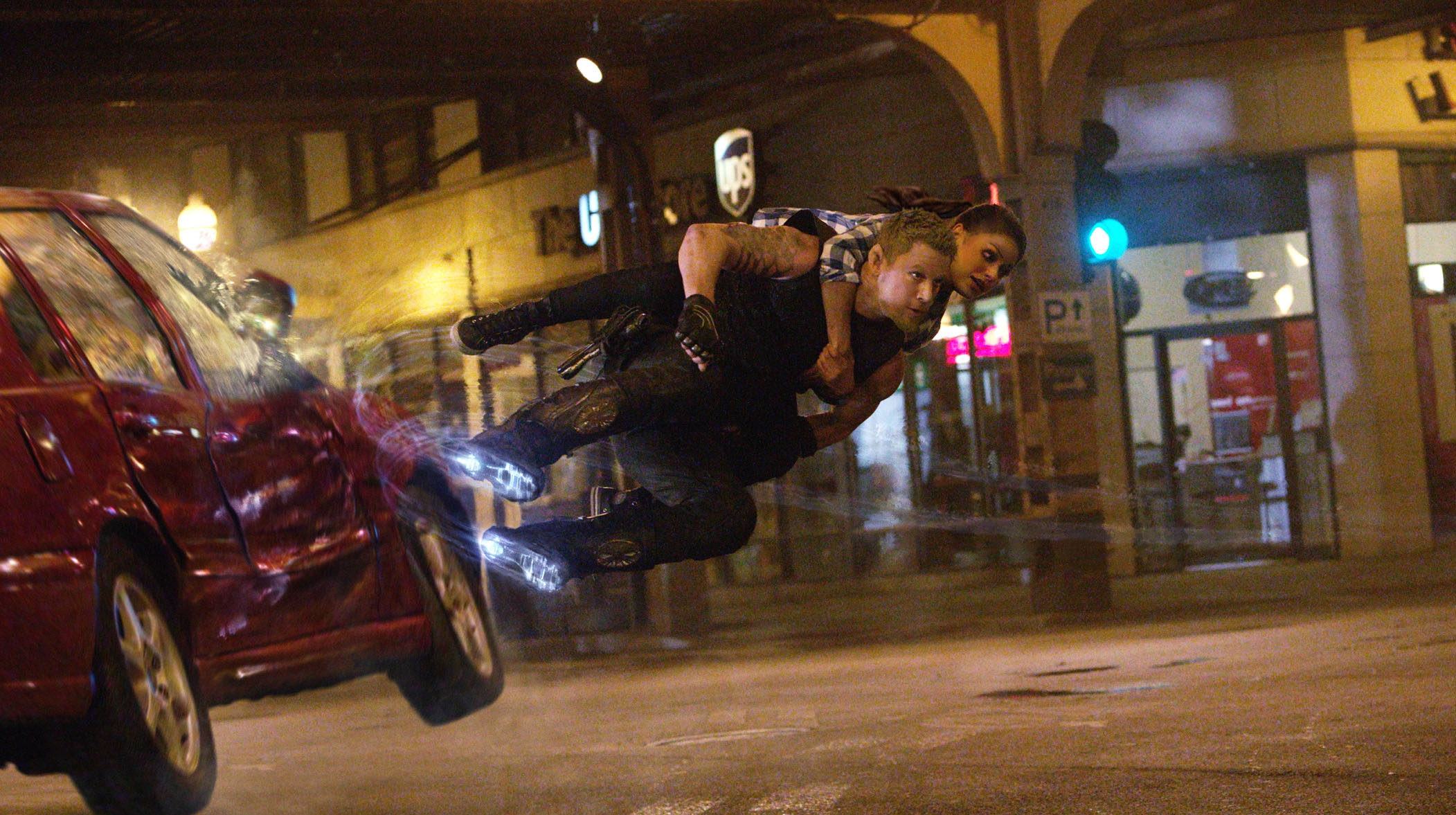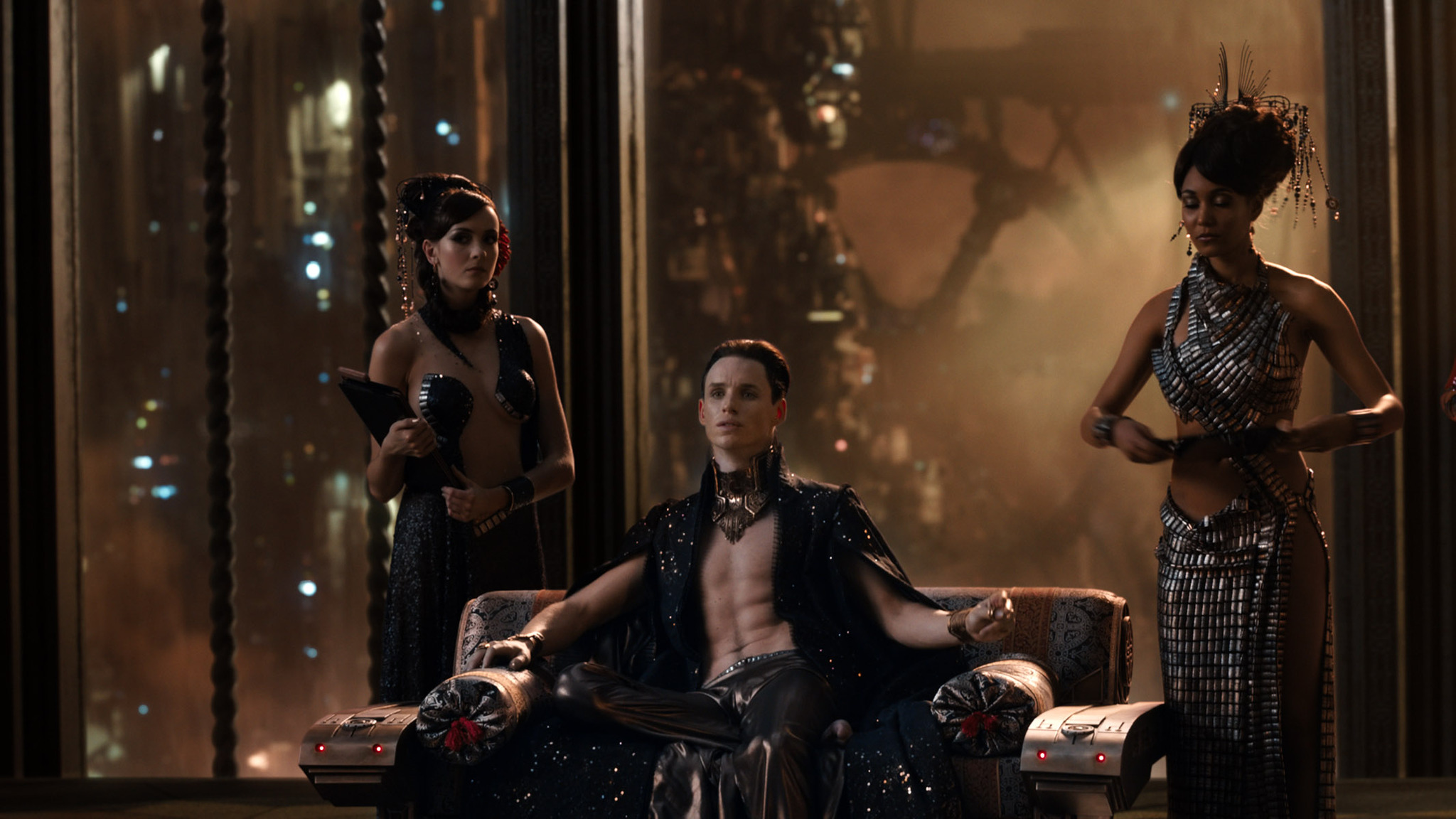

“My mother made me understand that every human society is a pyramid and that some lives will always matter more than others. It is better to accept this than to pretend it isn’t true.”
The Wachowskis are nothing if not bold. Ever since their single work of genius blew everyones’ minds they’ve released a string of films that swing for the fences in style. Whether it’s the underwhelming excess of the additional Matrix films, the hectic CGI bonanza of Speed Racer, or the ambitious blend of narrative complexity and visual spectacle in Cloud Atlas, they’ve yet to scale back. Jupiter Ascending feels like an amalgam of ideas from their earlier films recycled and repurposed—the harvesting of human bodies, hidden societies functioning right under our noses, gimcrack action sequences, murky labyrinthine plotting. Unfortunately, the aesthetic and the plot are so outrageous that the tone of the screenplay wavers uncertainly between baroque space opera and outright camp. The style and themes suggest that something like The Fifth Element or Stargate might have emerged. Instead we’ve got a Cinderella story mixed with Masters of the Universe and Flash Gordon that’s not sure if it wants to be an earnest effort or a pulpy spoof. The half-baked result might be recommended for its sheer amount of delicious cheesiness, but it’s not quite bad enough for kitsch appeal and besides, it’s much too expensive1 and try-hard to really qualify for it anyway.
Mila Kunis plays Jupiter Jones, a housekeeper living in Chicago with her argumentative and exploitative extended family. She unequivocally hates her life. But what she doesn’t realize is that she’s not just a displaced immigrant who shines the porcelain of richer folks’ homes. Far from it. She’s also the reincarnation of Mother Abrasax, the matriarch of the largest galactic dynasty known to man and the rightful owner not just of earth, but of a slew of other planets too. She learns all this and more from a wolf-angel hybrid named Caine Wise (Channing Tatum) who swoops in on his gravity boots and saves her life when a murderous gang of aliens sent by her pseudo-son Balem (Eddie Redmayne) tries to take her life. We are soon drawn into an epic feud between Balem and his two younger siblings, Titus (Douglas Booth) and Kalique (Tuppence Middleton), each of whom have their own diabolical plan for their reborn mother. Each of the three want the property that is hung up in their late mother’s will, which dictates that her estate be inherited by her DNA duplicate, namely Jupiter. There’s continuous pressure for her to sign forms and be branded with various insignias, but it’s impossible to parse the individual motives.

Like The Matrix, humans are farmed as a resource in Jupiter Ascending. Some hammy jargon describes how the essence of a human body can be harvested to produce a glowing liquid that the royal families bathe in to prolong their lives. As Kalique explains, resources are so abundant in the universe at large that the only thing worth fighting over—worth killing over—is time. By prolonging her lifespan by stealing the life force of others, Jupiter’s predecessor lived to be 90-something thousand years old before she was murdered by Balem—a crucial plot point that is easily guessable but keeps getting thrown out there like some impossible mystery—and Kalique claims to be fourteen thousand years old. The siblings’ machinations are presented in different forms, but each of them wants the same thing. Now Jupiter is all that stands between the bloodthirsty soul-reaping dynasty and every person she’s ever known. (To my recollection, it is never explained exactly why earth is so important to anyone except Jupiter. It is mentioned several times that earth is basically insignificant in the grand scheme of things, but they all want it so bad. Why though?)
There are a series of kidnappings, double-crosses, a political marriage proposal (who wouldn’t propose to their reincarnated mother?), memory erasures, etc. that amount to a blurry narrative in which I struggled to find any solid ground. At times it becomes almost impressive how quickly allegiances change and how little weight the action sequences carry. One minute Caine and his old commander Stinger “Bees Don’t Lie” Apini (Sean Bean)—half man, half honeybee—are engaging in fisticuffs; the next they’re teaming up to ward off Kalique’s hired guns; then Stinger accepts a bribe to double cross Caine and get his daughter medical care; then he helps Caine break through a formation of starships that are protecting Balem’s cruiser. Eventually the ratio of exposition to high-octane CGI action sequences weighs so heavily toward the latter that you kind of just have to give up any hope of a satisfying narrative.
From the start, the disparate visual elements never feel like parts of a whole. Recall how in The Matrix there was a very deliberate aesthetic. Outrageous at times, for sure, but definitely contained by some limitations. By contrast, Jupiter Ascending is all over the place. There are grey aliens, reptilian cryptids, and all manner of crossbred human-animals. The more humanoid characters are ridiculously costumed and made up with various ear sizes and goofy hairdos simply to look provocative but there’s little rhyme or reason. The sets are bedecked with all sorts of gaudy instruments, most prominently a fancy-schmancy Ipad that Balem keeps shoving in Jupiter’s face and a couple of archaic devices that Terry Gilliam uses in a cameo sequence that parodies Brazil.

The supporting cast are equally split amongst the three “evil” factions and so many of them shift allegiance that it’s basically a toss-up who’s working for who at any given time. After a while, it becomes clear that the only person Jupiter can trust is Caine. Of course, this means a super childish romance must be shoehorned in here, and let me just say it makes Neo and Trinity’s love story look positively brilliant by comparison. Let’s not even touch the fact that he’s half-wolf; just the dialogue and pacing and placement of the conversations are bad enough. And I think they knew that, which is why these sections feel more like a rom-com than a fantasy-drama. They knew it was going to come across as silly and so they preemptively made fun of themselves, to wit: Channing Tatum and Mila Kunis pause for a good fifteen seconds during a climactic fight sequence while a space city is burning and crumbling around them… to make out.
Some like to point out that the philosophy undergirding The Matrix is shallow and/or explored better elsewhere. Which is probably true. But nowhere else is it married to such bold and breathtaking visual pyrotechnics. Jupiter Ascending doesn’t appear to have a similarly brainy springboard and so we look to the visuals to at least keep things interesting. But it fails here too. So much creative juice went into making the stunts in The Matrix look great, but now it’s all done on the computer. The framing is suspect as it floats around unmoored. The sound is a metallic cacophony. And there’s a disgusting amount of digital junk crammed onto the screen for its own sake.
It’s a failure pretty much across the board, but its biggest offense is its story. It is routinely sidetracked to the point that the viewer can never settle down and thus can never get swept up by any of the plot developments. Jupiter, ostensibly the protagonist, really doesn’t do anything at all. She’s just escorted from planet to planet, listens to others spout dialogue at her, and then gets saved by Caine at the last minute. I’m afraid that the acting matches the level of the writing. Kunis is the only one who tries to make something of it, but she’s hamstrung by the material she’s given. Tatum mumbles his way through. Bean is serviceable and gets to tell Jupiter that “bees are genetically designed to detect royalty” with his earnest Yorkshire accent. But oh my goodness is Redmayne obnoxiously terrible—maybe intentionally so—almost to the point of flipping the script and becoming hilarious. For the entire movie, he either speaks in a raspy whisper or shouts at the top of his lungs.
It boggles the mind that the same team that created Bound and The Matrix and Cloud Atlas made such an empty film. Even bad effects cost money, and it seems like most of the $175M production budget went into the underwhelming visual spectacle.2 Which stinks because some of the ideas are very cool, or at least provocative. A wedding where all the attendees are identical robots; zero-gravity orgies; de-aging baths. It’s interesting stuff. But I don’t need peroxided goatees and mechanical wings and gravity boots and oversized mouse ears on a human and shirtless Channing Tatum and lizard people in trench coats and crumbling space cities and ray guns and human-animal hybrids—all stuff I’d give a tentative thumbs up to—if I don’t care about any of the people involved in the story. Too self-serious for campy charm and too dumb and overstuffed to be taken seriously, Jupiter Ascending is a dud. For a film so focused on the preciousness of time, it’s sickening to speculate how many thousands of years have been collectively wasted watching this travesty.
1. Even adjusting for inflation this thing cost ~twice as much to produce as The Matrix.
2. I recall a mere two instances where I thought the effects were good. One is when a bounty hunter shoots some kind of gravity ray at Jupiter as she runs through a cornfield and it lays flat a quarter-acre of head-high cornstalks. The second is when we witness the human harvesting operation for a brief moment and see a set of probes begin prodding and puncturing a human head.